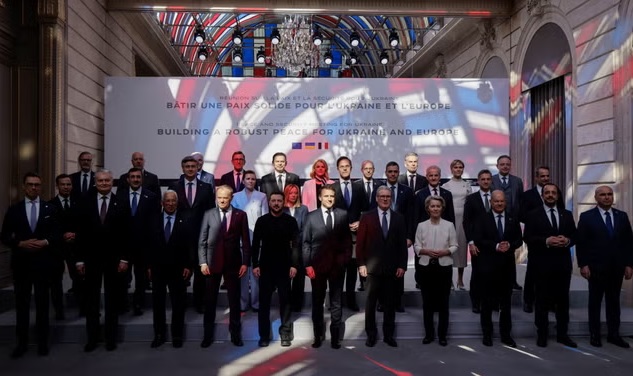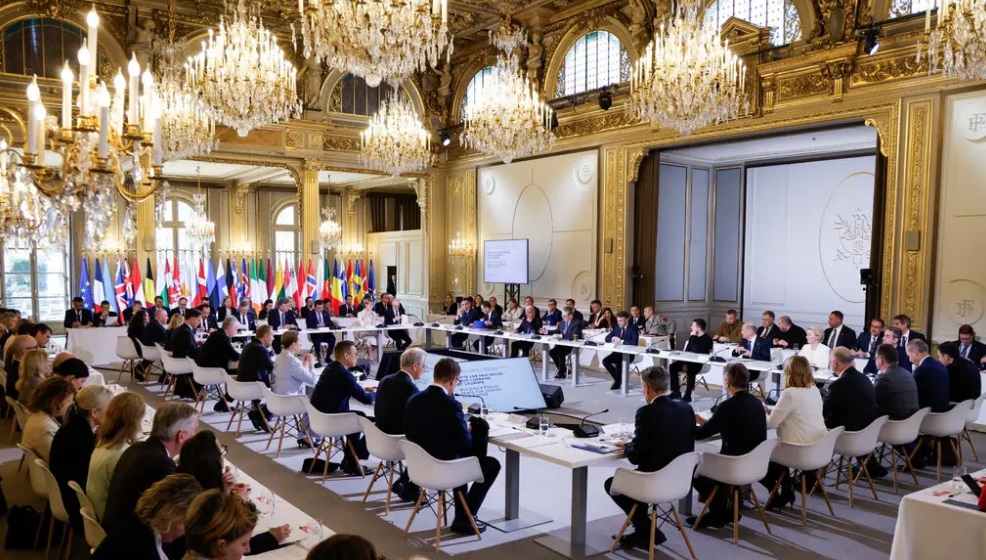 The “Coalition of the willing” in darkness…
The “Coalition of the willing” in darkness…
Photo: ‘The Independent’
France and Britain will continue to forge ahead with plans to deploy troops in Ukraine to defend an eventual peace deal with Russia but only some other nations want to take part, French President Emmanuel Macron said Thursday after a summit of countries that have been mulling the proposal, AP News reports.
The French leader said “several” nations other than France and Britain want to be part of the armed force but added, “It is not unanimous.” Paris and London say such a force would aim to secure any peace deal.
“We do not need unanimity to achieve it,” Macron said. French and British military officials will work with Ukraine to determine where the contingents should be deployed and how many troops they’d need to be a credible deterrent, the French leader added.
“There will be a reassurance force with several European nations that will deploy,” he insisted.
The summit of leaders of nearly 30 countries plus NATO and European Union chiefs came at a crucial juncture in the more than three-year war, with intensifying diplomatic efforts to broker ceasefires, driven by pressure from U.S. President Donald Trump.
One reason why some European countries are balking at a potential deployment in Ukraine is because it’s unclear whether Trump would support such a contingent with air power and other military assistance.
“This will require the engagement and support of the Untied States,” said U.K. Prime Minister Keir Starmer. “That’s a discussion we’ve had with the president on many occasions.”
Macron suggested they may have to do without U.S. backing.
“You have to hope for the best, but prepare for the worst,” he said. “My hope is that the Americans will be on our side and that the Americans will support, even play an active role.”
“But we have to be prepared for a situation where perhaps they won’t join in,” he added.
Building a force big enough to act as a credible deterrent — U.K. officials have talked about possibly 10,000 to 30,000 troops — would be a considerable effort for nations that shrank their militaries after the Cold War but are now rearming.
Starmer’s office said military planners from Europe and beyond have been drilling down into details, examining “the full range of European military capabilities including aircraft, tanks, troops, intelligence and logistics.”
Summit participants were more in agreement that sanctions squeezing Russia’s economy must be continued, and even toughened, to force Moscow to negotiate in good faith.
Russia has demanded that sanctions be lifted to meet its terms for the Black Sea ceasefire. The White House said it would help restore Russia’s access to the world market for fertilizer and farm exports, but it didn’t validate Moscow’s conditions. U.S. Secretary of State Marco Rubio said Russia’s demands would be evaluated and presented to Trump.
Macron announced a new package of defense aid for Ukraine that he said was worth 2 billion euros ($2.15 billion) and will include light tanks, air defense and anti-tank missiles and other weaponry and support.
 Macron assembled “Coalition of the willing” in Paris.
Macron assembled “Coalition of the willing” in Paris.
Photo: NYT
President Emmanuel Macron of France vowed on Thursday that a “Coalition of the willing” would keep supporting Ukraine in the war against Russia and would help safeguard an eventual peace — including, for some Europeans countries, by sending a “reassurance force” to Ukrainian soil after the conflict ends, ‘The New York Times’ remarks.
But Mr. Macron, who spoke at the end of a gathering of European leaders in Paris, said the contours of that force were still being ironed out, and details of who was willing to do what to give Ukraine security guarantees were still scarce.
But after three hours of discussions in Paris, Britain and France were still the only countries who have committed to the idea. Russia has called it unacceptable.
Speaking during a briefing with reporters on Thursday, Maria V. Zakharova, a Russian Foreign Ministry spokeswoman, called such a mission “military intervention in Ukraine under the guise of a peacekeeping mission.”
“It could lead to a direct military clash between Russia and NATO,” she added.
Mr. Macron acknowledged that the leaders had not found “unanimity” on a reassurance force. Italy wants to send troops on the ground only if they are part of a U.N. mission, while Poland has ruled it out entirely. Still, Mr. Macron said France and Britain would send military delegations to Ukraine to work on drawing up plans for the future of Ukraine’s army and for the size and scope of a reassurance force.
He later added that “within three to four weeks we’ll have a fairly precise action plan” on bolstering the Ukrainian army and creating a European force.
Thursday’s meeting came after similar gatherings by leaders and military chiefs in France and Britain, which are leading efforts to help Ukraine despite wavering American commitment. The leaders in Paris also promised to increase short-term military aid for Ukraine, Mr. Macron said, including by accelerating the disbursement of loans backed by Russian assets that were agreed upon last year.
“We also unanimously agreed that now was not the time to lift sanctions, whatever they may be,” he said.
The Kremlin has said it would honor portions of a deal on a cease-fire in the Black Sea that was struck this week only after Western countries removed restrictions on Russian agricultural exports — a demand that European countries have rejected.
President Trump’s special envoy, Steve Witkoff, has called the idea of a European force in Ukraine “simplistic” and “a posture and a pose” — even though the Trump administration has repeatedly berated Europe for doing too little to defend itself. Mr. Trump has not shown any willingness to provide American guarantees of Ukrainian security, which Mr. Starmer has said would be required for most European countries to consider committing troops.
“There’s still a lack of clarity about the nature of American commitments the day after,” Mr. Macron said, adding that when it came to U.S. support, “you have to hope for the best but prepare for the worst.”
The ‘coalition of the willing’ leaders:
- Italian Prime Miniser Giorgia Melono
- Portugal’s Prime Minister Luis Montenegro
- Cyprus chairman Nikos Christodoulides
- Spanish Prime Ministe: Pedro Sanchez
- Greek Prime Minister Kyriakos Mitsotakis
- Croatia’s Prime Minister Andrej Plenkovic
- Lithuanian chairman Gitanas Nauseda
- Polish Prime Minister Donald Tusk
- Slovenian Prime Minister Robert Golob
- German Chancellor Olaf Scholz
- Czech Prime Minister Petr Fiala
- Sweden’s Prime Minister Ulf Kristersson
- Finland’s President Alexander Stubb
- Estonian Prime Minister Kristen Michal
- Danish Prime Minister Mette Frederiksen
- Iceland’s Prime Minister Kristrun Frostadottir
- Belgian Prime Minister Bart De Wever
- Turkey’s Vice President Cevdet Yilmaz
Besides the country leaders, the group also includes European Commission President Ursula von der Leyen, EU Council President Antonio Costa, and NATO General Secretary Mark Rutte.
…European leaders believe that if they meet regularly in different European capitals and talk, and talk about some own things, then soon their words will turn into their victory over Russia? This is a very naïve hope...
Well, let them chat...
read more in our Telegram-channel https://t.me/The_International_Affairs

 10:38 28.03.2025 •
10:38 28.03.2025 •






















